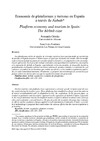Identificador persistente para citar o vincular este elemento:
https://accedacris.ulpgc.es/jspui/handle/10553/70654
| Título: | Economía de plataformas y turismo en España a través de Airbnb | Otros títulos: | Platform economy and tourism in Spain:The Airbnb case | Autores/as: | Jiménez González, Juan Luis Ortuño, Armando |
Clasificación UNESCO: | 531290 Economía sectorial: turismo | Palabras clave: | Airbnb Regulación Economía de plataformas Regulation Platform economy |
Fecha de publicación: | 2019 | Publicación seriada: | Cuadernos económicos de ICE | Resumen: | Las plataformas online de alquiler de viviendas turísticas han experimentado un crecimiento destacado en España durante el último lustro, al igual que alrededor del mundo. Ello ha modificado en buena medida las pautas de consumo alojativo turístico y, en adaptación a ello, la normativa de aplicación. En el presente trabajo realizamos una aproximación cualitativa y descriptiva a la expansión de Airbnb en España, especialmente en los dos modelos de desarrollo turísticos predominantes en España (cultural en centros urbanos de grandes ciudades y residencial de «sol y playa»), al análisis de la literatura que evalúa sus efectos y a los cambios regulatorios aplicados en cada Comunidad Autónoma. Finalmente, se propone una metodología de second-best que podría reducir los efectos adversos que la regulación actual está generando. | On-line touristic rent platforms have experienced a relevant growth in Spain (and all over the world) during the last five years. These platforms have modified to a large extent the patterns of tourist accommodation and, in adaptation to this, the regulations. In the present paper we conduct a qualitative and descriptive approach to the expansion of Airbnb in Spain, especially in the two predominant tourism development models in Spain (cultural in urban centers of large cities and residential «sun and beach»). We also describe the academic literature that evaluates its effects and the regulatory changes applied in each Autonomous Community. Finally, a second-best methodology is proposed that could reduce the adverse effects that the current regulation is generating. On-line touristic rent platforms have experienced a relevant growth in Spain (and all over the world) during the last five years. These platforms have modified to a large extent the patterns of tourist accommodation and, in adaptation to this, the regulations. In the present paper we conduct a qualitative and descriptive approach to the expansion of Airbnb in Spain, especially in the two predominant tourism development models in Spain (cultural in urban centers of large cities and residential «sun and beach»). We also describe the academic literature that evaluates its effects and the regulatory changes applied in each Autonomous Community. Finally, a second-best methodology is proposed that could reduce the adverse effects that the current regulation is generating. |
URI: | https://accedacris.ulpgc.es/handle/10553/70654 | ISSN: | 2340-9037 | DOI: | 10.32796/cice.2019.97.6800 | Fuente: | Cuadernos económicos de ICE [ISSN 2340-9037], n. 97, p. 133-153 |
| Colección: | Artículos |
Visitas 1
282
actualizado el 10-ene-2026
Descargas
264
actualizado el 10-ene-2026
Google ScholarTM
Verifica
Altmetric
Comparte
Exporta metadatos
Los elementos en ULPGC accedaCRIS están protegidos por derechos de autor con todos los derechos reservados, a menos que se indique lo contrario.
